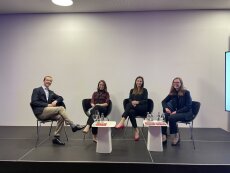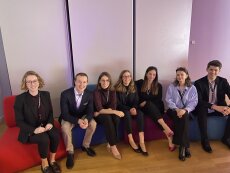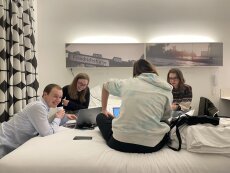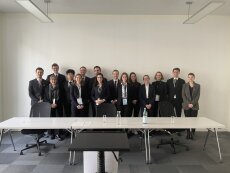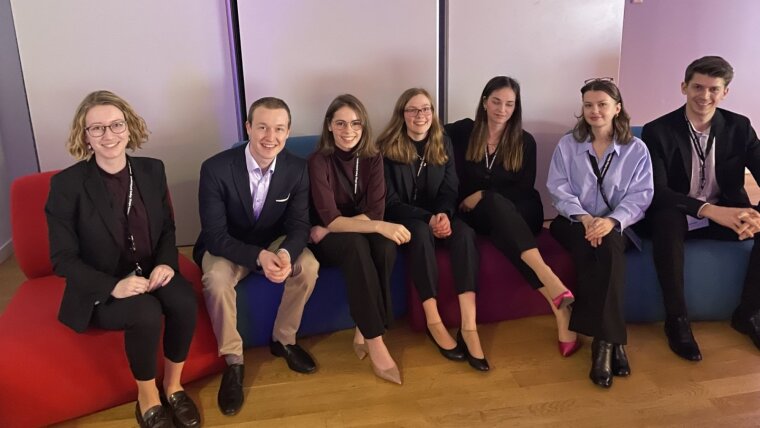
The Jessup Experience
The Jessup Moot Court is an international public law competition, simulating a fictional dispute between countries before the International Court of Justice, the judicial organ of the United Nations. Teams from over 100 countries compete against one another through the presentation of oral and written pleadings to address timely issues in the context of a hypothetical legal dispute between nations.
Since Jena had not fielded a team in recent years, it came as a nice change that this year, for the first time again, four ‘agents’, with the support of their ‘advisors’, entered the arena for the FSU at the national rounds in Berlin.
The Preparation
After the four of us (Anna Lochte, Saskia Hitschold, Paul Naumann and Katharina Preller) had been selected for the team through an application process and interviews conducted by our future coaches in July, the competition began in early September 2022. This was when the ‘Compromis’ a compilation of agreed facts that described the dispute we would deal with was released by ILSA, the competition’s organizer. It described a fictive conflict located on the ‘Gais Peninsular’, where the State of Ragnell had deployed its military in a territory it had leased from the Federation of Balan. Prior to that, freedom fighters, or terrorists – depending on who you ask – launched attacks against Ragnell, their belligerent occupant, or lawful lessee – again, depending on where you stand. The third country on the island, the Kingdom of Aglovale, became indirectly affected when hostilities escalated into an armed conflict between Ragnell and the insurgents. With the intention to force an end to the conflict, Aglovale imposed sanctions upon Ragnell.
Ultimately, Aglovale and Ragnell filed a suit against each other, and our team had to prepare to represent them in court. We began researching and preparing arguments, drafting and editing written pleadings, and practiced oral presentations to defend both States. After long nights and intense days, our team finally submitted two fifty-page long defense statements in January. In those documents, the representatives of Ragnell framed the military attack as an act of self-defense in line with the UN Charter, whereas the representative of Aglovale grasped the same issue as an act of aggression, violating the UN Charter. While the sanctions were unjustified coercive measures breaching the principle of non-intervention for Ragnell, they were legal countermeasures according to Aglovale.
The preparation sparked a variety of debates as the dispute partly resembled current conflicts; not only concerning Russia’s aggression against Ukraine and the subsequent EU sanctions but also with regards to ongoing occupations in Western Sahara and the Middle East, and the use of military forces to control non-state actors in Mexico. We were confronted with a row of unsettled hypothetical questions of international law: Can a third state bring a dispute before the court on behalf of another state? Should the International Court of Justice adjudge on questions pertaining to the law of the World Trade Organization? Often no ultimate answers could be found to those complex issues.
In the next phase, we focused on how to improve our oral performance. Persuasiveness, composure and politeness are all crucial competences needed in order to convince judges during the pleadings. Agents are requested to present their claims in a limited time, while being permanently interrupted with questions, thus a lot of preparation went into refining our knowledge of public international law.
Apart from the many practice sessions we had with our coaches, we also had the opportunity to take part in a practice pleading with Dr. Richard Happ from the Luther law firm and a dress rehearsal before professors of the faculty, the latter of which was also attended by many spectators and served as a final test for our skills before the actual competition. Both pleadings gave us ample opportunity to test our arguments before a new audience and we are very grateful for the support of all practice judges.
The Competition
The luggage was packed, the shirts ironed and the folders full of material, when we rolled towards Berlin on the 2nd March 2023 in order to compete against the other German universities. At the welcome reception at the Hertie School of Governance we had the opportunity to meet the other teams and some of the judges and organizers for the first time. Later in the evening we received the written submissions of the other universities against whom we would compete over the course of the next two days. Immediately, we started to examine them, trying to identify weak arguments or mistakes. It turned out, more than once, that the other teams took very different roads to defend their states, making it difficult to counter their arguments under time pressure. On Thursday and Friday we competed four times in total and in each round we collected points and received feedback from professional lawyers and academics who acted as judges.
On Friday evening we would finally learn which of the 17 teams would advance to the next rounds. Before that, the federal minister of justice gave a speech, talking about the increasing importance of public international law and how it affected his line of work specifically. When the advancing teams were announced, Jena was sadly not among them.
The next day, the final rounds would take place and although we would not compete in them ourselves, we, and all the other teams who had not advanced to this point, took the opportunity to observe the final match in the Kammergericht in Berlin, a wonderful match in which the participants showed their significant legal knowledge before judges from the ICJ and BVerfG, like Prof. Georg Nolte and Prof. Andreas Paulus. At the final gathering on Saturday, the three winning teams, which would advance to the International Rounds in Washington D.C. were announced as were the awards for best oralists, best memorials and many more. Although we did not reach one of the most coveted places, we did bring home the award for the most balanced team, which honors our fair play. We spent the rest of the evening celebrating with the other teams and returned to Jena the next day.
For all of us, the Jessup was a thrilling experience, and we highly encourage you to also use this opportunity, if you want to improve your skills in research, legal writing, and oral pleadings.
We are very thankful for the sacrificial assistance and commitment of our coaches Maximilian Beyer, Maira Müller and Polina Kulish, the suggestions from Prof. Alejandro Rodiles and the generous financial support from the Ernst-Abbe-Stiftung, without which our participation would not have been possible.
If you are interested in participating in the next Jessup competition for your university, please send an e-mail to Maximilian Beyer (maximilian.beyer@uni-jena.de).
